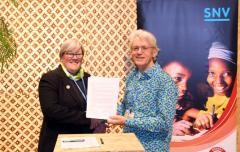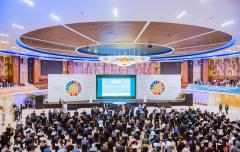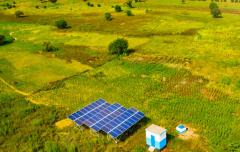Localization is critical to reaching sustainable energy for all
By: Martijn Veen - Global Head of Energy, SNV, and Sinead Crane - Marketing and Communications Advisor, SNV
At the SEforALL Forum in Rwanda, we took stock on how well we are progressing toward Sustainable Development Goal 7 (SDG7) - ensuring access to affordable, reliable, sustainable and modern energy for all.
With 760 million people globally not having access to electricity, of which 75 percent live in Sub-Saharan Africa, we are still far from achieving universal access to energy.
According to the International Energy Agency (IEA), Distributed Renewable Energy (DRE) solutions are the least-cost way to provide power to more than half of the global population and put them on the path to gaining access by 2030.
One thing is clear, though - to achieve universal energy access using DRE, our efforts need to be focused on localization of energy solutions. By this, we mean that energy solutions need to be locally embedded, and development support should focus on the local enabling environment, localization of finance, and ensuring that local businesses and communities are engaged in all activities. We can move further and faster toward reaching the SDG7 ambitious goals with a fully localized approach.
This is at the heart of all that SNV does. In fact, as an organization, we have a solid local presence in the 25 countries where we implement projects, with more than 90 percent of our 1,300+ staff based there. All projects are developed and run by our local offices and staff in partnership with local networks and stakeholders. We believe with our feet on the ground, projects are more effectively implemented, and we can make a significant and lasting contribution to systems change.
The localization of finance is also a critical factor in ensuring the long-term sustainability of our interventions. Recently, SNV and our partner Sunfunder published a whitepaper on the local embedding of market support mechanisms and innovative finance. The paper focused on Results-Based Financing (RBF), a tool that the private sector has embraced as a mechanism to accelerate additional investment and scale up energy access. However, these structures and many other financial support initiatives are often developed remotely, which can lead to poor uptake and lack of local embedding. The main lessons learnt from this paper are:
- Involve local companies from the design phase of an RBF fund.
- Support national-level ownership and a conducive enabling environment by ensuring universal access to energy is at the top of the agenda for national governments.
- Ensure to contribute to systems change – actions need to target sustainability of interventions and further scaling of impact.
In fact, we should apply these lessons across the board in all projects and financial initiatives aiming to stimulate sustainable energy market development in low- to middle-income countries. Involving small, local enterprises is key to ensuring systems change - if organizations only engage well-established commercial companies that can operate at scale anyway, we have failed in our objective. Local companies tend to be product agnostic and can adjust their business offerings to a local context and respond to local dynamics.
In terms of supporting the enabling environment at the local level, a good example of this can be seen in the UK Aid-funded BRILHO Energy Africa programme in Mozambique The project includes a component on Policy Reform and Institutional Strengthening in addition to its USD 19 million Market Development Fund, which includes early-stage grants, RBF and technical assistance for DRE companies. Working with Mozambique’s Ministry of Mineral Resources and Energy, the Mozambique Energy Fund and other critical stakeholders, BRILHO supported the development of the country’s first off-grid energy regulation.
Beyond achieving concrete results in terms of energy access projects, we need to be ambitious and target local systemic change: making sure that impact continues to be delivered and further scaled up after a project has ended. In Kenya, SNV significantly contributed to systems change through increased adoption of clean cookstoves and fuels. To make this happen, the Voice for Change Partnership (V4CP) energy team with local civil society organizations led the transition from traditional to clean cooking through national and county plans, regulations and budgets. Therefore, directly impacting institutional embedding and shifting markets by advocating for conducive policies (tax incentives, standards) and by increasing awareness and demand for clean cookstoves. The changes observed in turn contributed to results in terms of leveraging finance and shifting norms.
The message that we reiterated to SEforALL Forum attendees and continue to stress is how critical localization is in reaching the SDG7 target and long-term sustainable systems change. We encourage all partners and stakeholders working in this sector to prioritize local embedding of energy access initiatives at every step - from design to implementation to ensure sustainable systems change.




